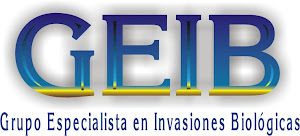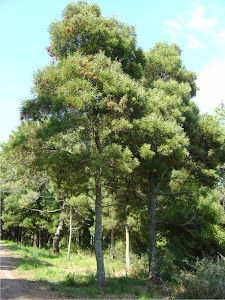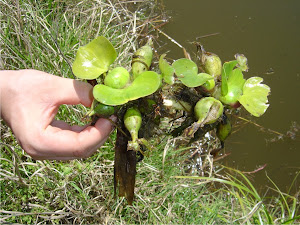 - The GEIB signed an agreement with the Fundació Territori i Paisatge of Caixa Catalunya to produce a poster on some of the worst invasive alien species present in Spain.
- The GEIB signed an agreement with the Fundació Territori i Paisatge of Caixa Catalunya to produce a poster on some of the worst invasive alien species present in Spain. - The GEIB, entrusted by the Bern Convention (Council of Europe), is preparing a report on Invasive Alien Species and Climate Change . The first draft report was presented in the meeting of the Group of Experts on Biodiversity and Climate Change of the Bern Convention. Dates: 13-15 March 2008, Sevilla, Spain.
- The GEIB participated to the European Conference on Invasive Alien Species held in Madrid (Spain) the 15th-16th January 2008. The conference provided stakeholders an opportunity to meet and exchange knowledge on the issues involved in this matter. For more information http://www.fundacion-biodiversidad.info/eei/
- The GEIB participated in Sustainability Forum of the Pamplona City Council giving a series of lectures in the cycle Introduced and Invasive species: current situation. The initiative is part of the program run by the San Pedro Museum for Environmental Education. Dates: 2nd, 3rd and 4th October 2007.
NEW PROJECTS
The Atlantic Islands Initiative
Insular ecosystems are more vulnerable to biological invasions than the continental ones and the chance they suffer serious losses in terms of biodiversity due to IAS is higher. Nevertheless a successful management response to reduce and halt the risks of IAS is more feasible. Therefore initiatives to protect these special ecosystems are essential. The Atlantic Island Initiative aims to strengthen the conservation of the biodiversity of the Atlantic Islands based on scientific knowledge and cooperation among the involved stakeholders. One of the main steps of the present initiative is the execution of a pilot project on Risk Analysis for invasive alien species within the framework of prevention and early detection promoted by the GEIB.
Coordinator of the project: Laura Capdevila-Argüelles
Inconvenient guests: the prevention of biological invasions begins at school
Biological invasions are one of the greatest threats to biodiversity having also serious consequences on public health and local economies. Humans are the main cause of the problem, therefore it is an imperative that strategies dealing with invasive alien species should include elements designed to change human values, beliefs and behaviours in all sectors of the society. The solution to the problem requires the understanding and participation of citizens who could play a relevant role in the prevention of biological invasions by means of their choices in the global trade. In this framework “Inconvenient Guests” pretends to be one of the first contributions in Spain to improve the understanding and general knowledge on biological invasions by means of formal and informal education and a pioneering project in the field of didactics as well as a point of reference for the education sector.
Coordinator of the project: Bernardo Zilletti












